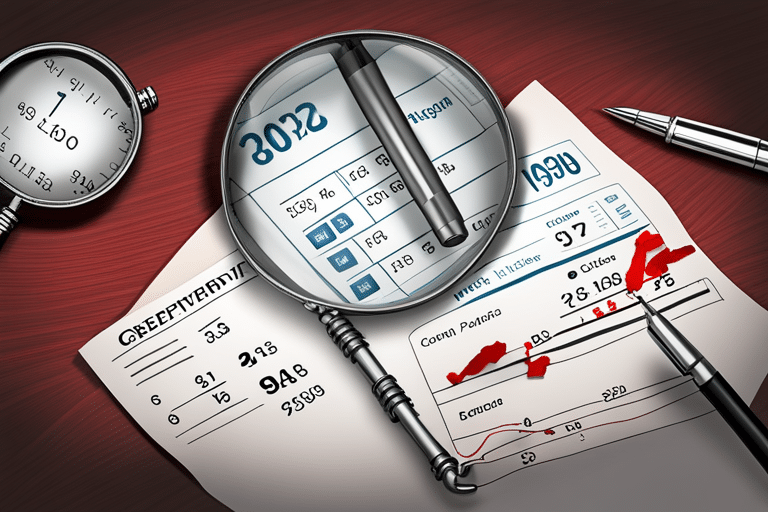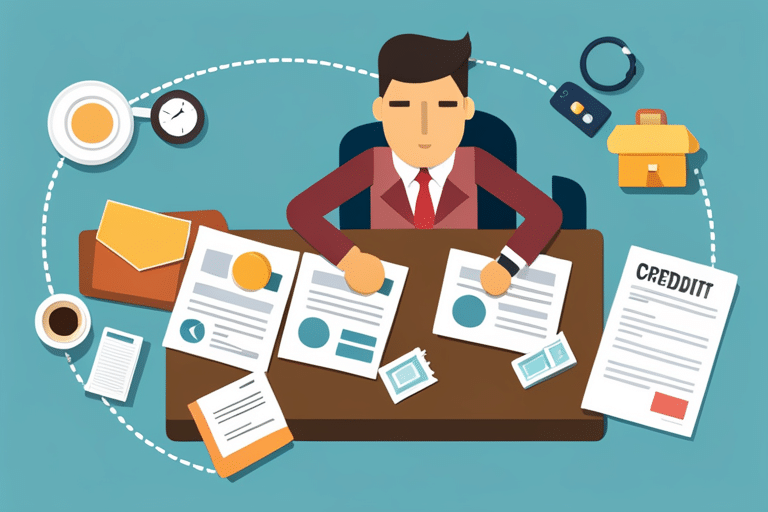So, you’re feeling a bit overwhelmed by that pesky credit score of yours? Don’t worry, we’ve got your back. In this comprehensive guide, we’ll show you how to repair your credit score and get back on track.
You might be thinking, ‘But isn’t it going to be complicated?’ Well, fear not! We’ve broken it down into simple steps that anyone can follow.
So let’s dive in and start mastering the art of credit score repair, shall we?
Key Takeaways
- Payment history and responsible debt management are crucial for improving credit score.
- Identifying and disputing negative items on your credit report can help improve your creditworthiness.
- Creating a budget and payment plan helps manage finances effectively and prioritize debt repayment.
- Maintaining good credit habits, such as paying bills on time and keeping credit utilization low, is important for repairing your credit score.
Understanding Your Credit Score

Understanding your credit score is crucial for improving your financial health. It’s like having a secret code that determines how trustworthy you are when it comes to managing money. So, let’s crack this code together and unravel the mysteries of credit scores.
When it comes to understanding your credit score, there are a few factors at play. Think of it as a recipe for financial success. The first ingredient is payment history – how punctual you are with paying back those bills on time. Then we have the amount owed, or what I like to call the ‘credit utilization dance.’ You see, using too much of your available credit can do some serious damage to your score, kind of like wearing socks with sandals – it’s just not a good look.
But fear not! You don’t have to be an expert mathematician to figure out this formula. Just remember that keeping your credit utilization below 30% is key. It’s all about finding that sweet spot between not using too much of your available credit and not being afraid to whip out the plastic when necessary.
Now, let me drop some knowledge bombs about the impact of credit utilization on your score. When lenders see that you’re using too much of your available credit, they might think you’re living beyond your means or struggling financially. But if you keep that utilization low and show them you can manage your debts responsibly, they’ll be more likely to trust you with their precious moolah.
Assessing Your Current Credit Situation

Assessing your credit situation starts with checking your current credit score. It’s like taking a peek at the report card of your financial life, except this time it’s not just about grades – it’s about cold, hard cash. So grab a cup of coffee, sit back, and let’s dive into the world of assessing your creditworthiness!
-
Payment history: This is where you find out if you’ve been a responsible debtor or a wild spender. Late payments? Ouch! Those can drag down your credit score faster than a cheetah chasing its prey.
-
Credit utilization: Ah, the magical ratio between how much credit you have available versus how much you’re actually using. Keep it low and watch that score soar! If you’re maxing out every card in sight, well…let’s just say it won’t be good for your financial reputation.
-
Length of credit history: Think back to that first awkward date with credit cards; they were nervous and so were you. But over time, as you built trust and paid those bills on time (hopefully), your relationship blossomed into something beautiful. The longer the history, the better it looks on paper.
Now that we have these factors in mind, take a moment to assess where you stand in each category. Is there room for improvement? Don’t worry if things aren’t perfect – nobody expects perfection here (except maybe some mathematicians). Just focus on understanding these factors and how they affect your overall creditworthiness.
Identifying Negative Items on Your Credit Report

Identifying negative items on your credit report is the key to uncovering any potential red flags that could be impacting your financial health. It’s like being a detective, searching for clues to solve the mystery of why your credit score isn’t as high as you’d like it to be. But fear not, my friend, for I am here to guide you through this process with a lighthearted and humorous touch.
Now, let’s talk about fraudulent activities. These sneaky little devils can wreak havoc on your credit report without you even realizing it. They’re like the villains in a spy movie, trying to sabotage your financial reputation. But don’t worry, because just like James Bond foils his enemies’ plans, you can foil theirs too. Keep an eye out for any unfamiliar accounts or transactions that could indicate fraudulent activity.
Next up, we have credit report errors. These are like innocent mistakes that somehow managed to find their way onto your report. It’s as if someone accidentally spilled coffee on important documents and now you have random stains all over them. But fear not! You can dispute these errors and get them removed from your report faster than a superhero swooping in to save the day.
Disputing Inaccurate Information

Now that you’ve detected those pesky inaccuracies on your credit report, it’s time to take action and dispute them like a true champion. You may be thinking, ‘What’s the big deal? Can’t I just ignore them and hope they magically disappear?’ Well, my friend, credit repair requires a little more effort than waving a wand and uttering some magical incantation.
But fear not! With the right knowledge and strategy, you can tackle those errors head-on and restore your credit score to its former glory.
Here are three steps to help you navigate the credit bureau process and successfully dispute errors:
-
Gather Your Evidence: Before diving into battle with the credit bureaus, arm yourself with concrete evidence to support your claim. Collect any documentation or records that prove the inaccuracies on your report. Remember, you’re fighting for truth and justice here!
-
Craft Your Dispute Letter: Channel your inner Shakespeare (or at least try) as you draft a well-crafted dispute letter addressing each error in detail. Be clear, concise, and persuasive in explaining why these discrepancies need to be corrected. And don’t forget to attach copies of your evidence – it’s like adding an extra punch to your argument!
-
Send it Off: Time to seal the envelope (or hit that ‘send’ button) and send your dispute letter off into the wild world of credit bureaus. Make sure to keep copies of everything for future reference because hey, even champions need proof of their heroic deeds!
Creating a Budget and Payment Plan

If you want to take control of your finances, it’s important to create a budget and payment plan that works for you. But let’s face it, budgeting can be about as exciting as watching paint dry. That’s why I’m here to make it fun and easy for you! Let’s dive into some budgeting strategies and debt repayment tips that will have you feeling like a financial ninja in no time.
First things first, grab a cup of coffee (or tea if that’s more your style) and sit down with all your bills and expenses laid out in front of you. Take a deep breath, because we’re about to unleash the power of organization on those pesky debts.
Start by listing all your monthly income sources – whether it’s from work or side gigs – and then subtract all your fixed expenses like rent, utilities, and car payments. Now comes the exciting part: allocating funds for different categories like groceries, entertainment, and savings. It’s like playing detective with your money!
Once you’ve got your budget set up, it’s time to tackle that debt mountain. Start by identifying which debts have the highest interest rates – those are the ones we want gone ASAP! Make minimum payments on all your other debts while putting any extra money towards paying off these high-interest beasts.
Negotiating With Creditors and Collection Agencies

When negotiating with creditors and collection agencies, it’s important to be assertive yet respectful in order to reach a mutually beneficial agreement. Remember, you hold the power to take control of your financial situation and settle your debts.
Here are three essential tips to help you navigate the negotiation process:
-
Be prepared: Before contacting your creditors or collection agencies, gather all the information about your debts. Know exactly how much you owe, including any interest or late fees that may have accrued. This will give you a clear understanding of what you can afford to pay and help you negotiate from a position of knowledge.
-
Stay calm and composed: Negotiations can sometimes become tense, but it’s crucial to remain calm throughout the process. Take deep breaths if necessary and remember that both parties want to find a solution. Keep your emotions in check, as getting angry or frustrated won’t help resolve the situation.
-
Offer a reasonable payment plan: When proposing a payment plan, make sure it is realistic for both sides. Determine how much you can afford to pay each month while also considering your other financial obligations. Present this plan confidently and explain why it is feasible for you.
By following these tips, you’ll increase your chances of reaching an agreement that works for both parties involved.
Now that you’ve tackled negotiating payments with creditors and collection agencies like a pro, let’s move on to exploring debt consolidation options. This next step will help simplify your repayment process by combining multiple debts into one manageable monthly payment.
Exploring Debt Consolidation Options

So, you’ve decided that debt consolidation might be the answer to your financial woes. Well, buckle up because we’re about to dive into the pros and cons of this popular method.
From potentially simplifying your payment schedule to the possibility of paying more interest in the long run, we’ll cover it all.
Plus, we’ll let you in on some insider tips for finding the best consolidation methods out there.
Get ready to take control of your debts like a boss!
Pros and Cons
To weigh the pros and cons of repairing your credit score, you should consider the potential impact on your financial future. Sure, it may seem like a daunting task, but fear not! Here are three things to keep in mind:
-
Pros: By improving your credit score, you open doors to better interest rates on loans and credit cards. You’ll be seen as a more reliable borrower, which can save you loads of money in the long run.
-
Cons: Repairing your credit score takes time and effort. It won’t happen overnight, so patience is key. Additionally, some methods may require paying fees or working with credit repair companies.
-
Alternative Methods: If traditional methods aren’t for you, there are alternative ways to repair your credit score. Consider negotiating with creditors or seeking help from nonprofit organizations that offer financial counseling.
Best Consolidation Methods
Looking to consolidate your debts? Here are some of the best methods to consider. Debt settlement and credit counseling can be effective ways to manage your finances and get back on track. Let’s break down these options in a fun and informative table:
| Method | Pros | Cons |
|---|---|---|
| Debt Settlement | Reduces total debt amount | May negatively impact credit |
| Credit Counseling | Helps create a budget | Requires ongoing commitment |
Now that you have an overview, let’s dive deeper into each method. Debt settlement involves negotiating with creditors to pay off your debts for less than what you owe. It can save you money, but it may also harm your credit score temporarily. On the other hand, credit counseling offers guidance in creating a budget and managing your finances effectively. It requires dedication, but it helps build healthier financial habits.
Building a Positive Credit History

So, you want to build a positive credit history, huh? Well, buckle up because we’re about to dive into the exciting world of Credit Card Utilization, Payment History Importance, and Length of Credit History.
These three amigos are like the holy trinity of creditworthiness – master them and your credit score will skyrocket faster than a squirrel on caffeine.
Credit Card Utilization
One key factor in improving your credit score is keeping your credit card utilization low. This means you should aim to use only a small percentage of your available credit limit.
Here are three tips to help you achieve this:
-
Be mindful of your spending: Before whipping out that shiny plastic, ask yourself if the purchase is truly necessary. Do you really need that unicorn-shaped pool float? Maybe not.
-
Pay off your balance in full each month: By doing so, you avoid accruing interest and keep your overall credit utilization low. Plus, it’s like sticking it to the banks – take that, Wall Street!
-
Consider using credit card rewards wisely: Make those reward points work for you! Use them for things like travel or cash back instead of maxing out your card on questionable online shopping binges.
Payment History Importance
Paying your bills on time is crucial for maintaining a good credit score. Let’s face it, nobody likes paying bills, but think of it as a necessary evil to keep those digits in check.
Your payment history impact is one of the most important credit score factors that lenders consider. It’s like the report card of your financial responsibility. Late payments can be like red flags waving frantically, signaling to lenders that you may not be the most reliable borrower.
Length of Credit History
If you’ve had credit for a long time, lenders will view you as more reliable and responsible. Your credit history plays a significant role in determining your credit score. So, it’s not just about paying your bills on time; the length of your credit history matters too!
Here are three reasons why:
-
Credit Limits: Having a longer credit history means you’ve likely built up higher credit limits over time. This shows that lenders trust you with larger amounts of money, which reflects positively on your financial responsibility.
-
Credit Mix: A lengthy credit history allows you to diversify your credit mix by having different types of loans or lines of credit (e.g., mortgages, car loans, and credit cards). Lenders like to see that you can handle multiple forms of debt responsibly.
-
Consistency: Maintaining good standing over an extended period demonstrates consistency in managing your finances. It shows that you’re not just a one-hit-wonder when it comes to handling credit.
Monitoring Your Credit Score Progress

To keep track of your credit score progress, you should regularly check your credit report for any changes or discrepancies. Think of it as spying on your credit score’s secret life. You want to know everything that’s going on behind the scenes, right? Well, monitoring your credit score is like being a detective on a mission to uncover any suspicious activity.
First things first, get yourself set up with a reliable credit score monitoring service. It’s like having a personal bodyguard for your financial reputation. These services will alert you whenever there’s a change in your credit report, whether it’s an increase or decrease in your score or if someone tries to open an account in your name (cue dramatic music).
Once you’re all set up with the monitoring service, make it a habit to check in on your credit report regularly. It’s like checking the weather forecast before heading out – you want to be prepared for whatever comes your way. Look out for any errors or discrepancies that could be dragging down your score and take action immediately to rectify them.
Monitoring isn’t just about catching mistakes; it’s also about tracking your progress towards improving your credit score. Celebrate those small victories when you see that number inching higher! It’s like watching plants grow – slow and steady wins the race.
Maintaining Good Credit Habits

Maintaining good credit habits is essential for keeping your financial reputation in tip-top shape. And let’s face it, having a good credit score just feels good. It’s like getting a gold star on your report card or winning an award for being the best at something.
So, if you’re ready to take control of your finances and keep that credit score soaring high, here are three credit-savvy tips for you:
-
Pay Your Bills On Time: This may seem obvious, but it’s worth mentioning because late payments can really do some damage to your credit score. Set up automatic reminders or alerts on your phone to make sure you never miss a due date again. Trust me, your future self will thank you.
-
Keep Your Credit Utilization Low: Credit utilization is the fancy way of saying how much of your available credit you’re using. Aim to keep it below 30%. Think of it like this: You want to have plenty of room on the dance floor at all times – no crowded spaces here! So resist the urge to max out those shiny new credit cards.
-
Seek Credit Counseling: Sometimes we all need a little expert advice when it comes to our finances. Consider working with a reputable credit counseling agency who can help guide you through any challenges or concerns you may have about managing your credit effectively.
Frequently Asked Questions
Can I Repair My Credit Score Without Paying off My Outstanding Debts?
You might be tempted to repair your credit score without paying off outstanding debts, but it’s like trying to run a marathon with weights strapped to your ankles. It’s best to tackle those debts head-on for better credit repair options.
Will My Credit Score Be Affected if I Close an Old Credit Card Account?
Closing an old credit card account can potentially impact your credit score. However, there are alternatives to consider before taking that step. Let’s explore how you can navigate this tricky situation without sabotaging your credit score.
How Long Does It Typically Take to See an Improvement in My Credit Score After Implementing Credit Repair Strategies?
You’re eager to see improvements in your credit score after implementing credit repair strategies. The timeline can vary depending on factors like payment history and debt ratio, but hang in there!
Are There Any Legal Consequences for Disputing Inaccurate Information on My Credit Report?
Disputing inaccurate information on your credit report won’t land you in legal trouble. In fact, it’s your right! So go ahead and challenge those errors with confidence to improve your credit score.
Can I Negotiate a Settlement With My Creditors Even if I Am Already in a Debt Consolidation Program?
Even if you’re in a debt consolidation program, you can still negotiate settlements with your creditors. It may take some finesse and persistence, but it’s worth a shot to lighten your load.
Conclusion
Congratulations on reaching the end of this comprehensive guide on repairing your credit score.
Now, here’s a little tidbit for you: did you know that individuals who actively work on improving their credit score can see an average increase of 40 points within just six months, according to a recent study?
That’s right! With dedication and some clever strategies, you can turn your credit woes into credit wows!
So go ahead, take control of your financial future and get ready to soar to new heights.
Happy credit repairing!

